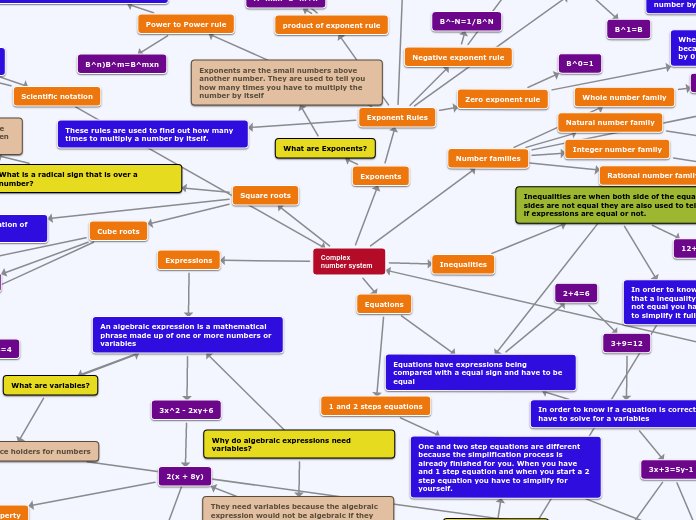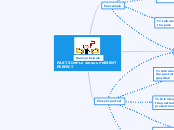Prime factorization
Prime factorization is used to write numbers using prime numbers
__24__
_4_x_6_
2x2|2x3
Scientific notation
Way of writing really small or large numbers
If the exponent is negative then the number decreases and if it is positive then It increases
1x10^3=1000
1x10^-3=0.001
Base is always 10
coefficient = 1-9
Red=MAIN TOPIC
Purple=Examples
Tan=Answers
Yellow=Questions
Orange=Topics
Blue=Explanations
Rational number family
(1.75,0.22_,3.22,4.82,1.33_)
Relationships between expression and equation
Expression 2(x + 8y)
Equation 2(x + 8y) = 3x + 4
expressions are used to write numbers using a sequence of symbols and equations are used to show the equality of numbers
What is simplification?
Simplification is when you break topics down for other people to understand.
Why do algebraic expressions need variables?
They need variables because the algebraic expression would not be algebraic if they did not have variables
Complex number system
Number families
Irrational number family
(3.179580729_,pi,5.1327957324_)
Any repeatng without a pattern or non-terminating numbers
Integer number family
(-3-2-1,0,1,2,3)
Any positive or negative whole number including zero
Natural number family
(0,1,2,3,4,5,6)
Any positive whole number including zero.
Whole number family
(1,2,3,4,5,6)
Any positive whole number
Exponents
What are Exponents?
Exponents are the small numbers above another number. They are used to tell you how many times you have to multiply the number by itself
Exponent Rules
These rules are used to find out how many times to multiply a number by itself.
One exponent rule
When you multiply a positive 1 you keep the base because whenever you multiply any number by 1 you keep the number
B^1=B
Power to Power rule
This means that whenever you multiply a exponent by a exponent with the same base then you make them come together
B^n)B^m=B^mxn
Quotient of exponent rule
When you divide exponents you subtract the variables from each other to determine how many times you multiply the base by itself
A^m/n=A^m-n
product of exponent rule
This means whenever you multiply a exponent you multiply the variables together
A^mxn=a^m+n
Zero exponent rule
When you multiply the base by 0 you get 1 because anytime you multiply any number by 0 you get 1.
B^0=1
Negative exponent rule
When you multioly the base by a negative exponent you flip it to make it a fraction and flip the negative exponent and make it positive
B^-N=1/B^N
Square roots
Square roots are the inverse operation of exponents
4^2=16
square root of 16=4
What is a radical sign that is over a number?
The radical sign tells you to figure out the base of the original exponent and and then multiply the base by itself once
Without a number outside to the radical sign you can just assume that it is just a square roots
Cube roots
Cube roots also use the radical sign but they put a 3 on top of the left side of the radical sign
Cube roots are only used whenever a number and can have a exponent of 3 can fit inside the original number 3 times.
4^3=64
cube root of 64=4
Inequalities
Inequalities are when both side of the equal sides are not equal they are also used to tell if expressions are equal or not.
In order to know that a inequality is not equal you have to simplify it fully
12+6=17
27-5=12
Equations
Equations have expressions being compared with a equal sign and have to be equal
2+4=6
3+9=12
In order to know if a equation is correct you have to solve for a variables
3x+3=5y-1
This method is called substitution where you input the numbers in for the variables.
3(2)+3=5(2)-1
6+3=10-1
9=9
x=2 y=2
1 and 2 steps equations
One and two step equations are different because the simplification process is already finished for you. When you have and 1 step equation and when you start a 2 step equation you have to simplify for yourself.
Expressions
An algebraic expression is a mathematical phrase made up of one or more numbers or variables
What are variables?
variables are place holders for numbers
3x^2 - 2xy+6
2(x + 8y)
distributive property
distributive property is when you have a number outside of a parentesis and you have to distribute the outside number to the inside numbers









